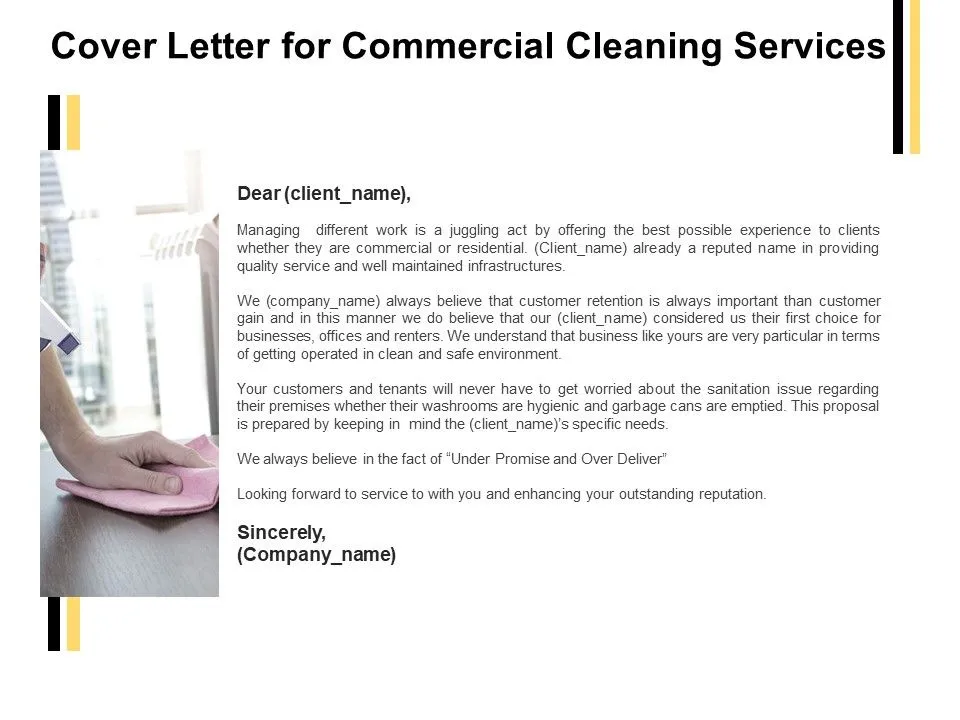Crafting Your Cleaning Services Cover Letter
A well-written cover letter is your first chance to make a positive impression on a potential employer in the cleaning services industry. It’s more than just a formality; it’s your opportunity to showcase your skills, experience, and personality. Think of it as a personalized introduction, setting the stage for your resume and highlighting why you’re the perfect fit for the job. This guide will walk you through the essential steps of crafting a compelling cover letter that gets noticed and helps you land an interview. It’s about presenting yourself as a reliable, detail-oriented, and trustworthy candidate who can deliver exceptional cleaning services.
Formatting Your Cover Letter
The format of your cover letter is crucial for readability and professionalism. Use a clean and easy-to-read font like Arial or Times New Roman, with a font size between 10 and 12 points. Maintain consistent margins (typically 1 inch on all sides) to create a balanced look. The cover letter should be single-spaced with a space between each paragraph. Ensure that your contact information, the date, the hiring manager’s information, and your closing are all properly aligned. A well-formatted cover letter shows that you pay attention to detail, a vital quality in cleaning services.
Contact Information Section
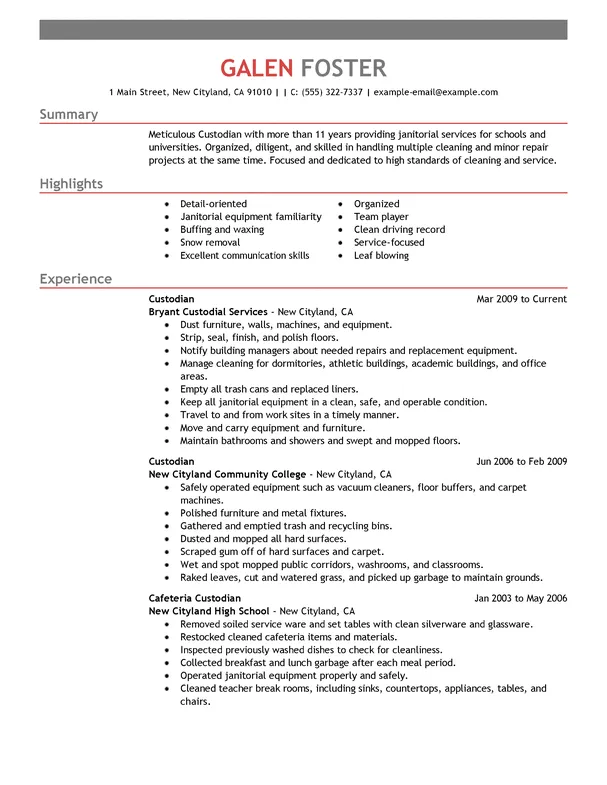
At the top of your cover letter, include your contact information. This should include your full name, phone number, email address, and optionally, your LinkedIn profile URL. Following this, include the date and the hiring manager’s name and title (if known), and the company’s name and address. Always verify the correct spelling of the hiring manager’s name; addressing the letter to a specific person shows you’ve done your research and increases the likelihood of the letter being read by the intended recipient. This section is vital for the employer to reach you quickly.
Your Introduction
Your introduction should immediately grab the reader’s attention. Start by stating the specific position you’re applying for and where you saw the job posting. Briefly mention your most relevant qualification or a key skill that aligns with the job requirements. Avoid generic opening lines like “I am writing to express my interest.” Instead, be direct and highlight what makes you stand out. For example, “I am writing to apply for the Cleaning Specialist position advertised on [Platform], bringing five years of experience in providing exceptional cleaning services and a strong commitment to maintaining pristine environments.” Make your introduction concise and compelling.
Highlighting Your Skills and Experience
The body of your cover letter is where you showcase your skills and experience. This section should detail your relevant skills, cleaning experience, and achievements. Don’t just list your responsibilities; instead, explain how your skills and experience directly benefit the employer. For example, mention how you consistently exceeded cleanliness standards, managed your time efficiently to complete tasks, or received positive feedback from previous clients. This section allows you to connect your qualifications to the specific requirements of the cleaning service position, demonstrating your value to the company. Focus on the tasks and skills that are most applicable to the job you are applying for.
Relevant Skills to Showcase
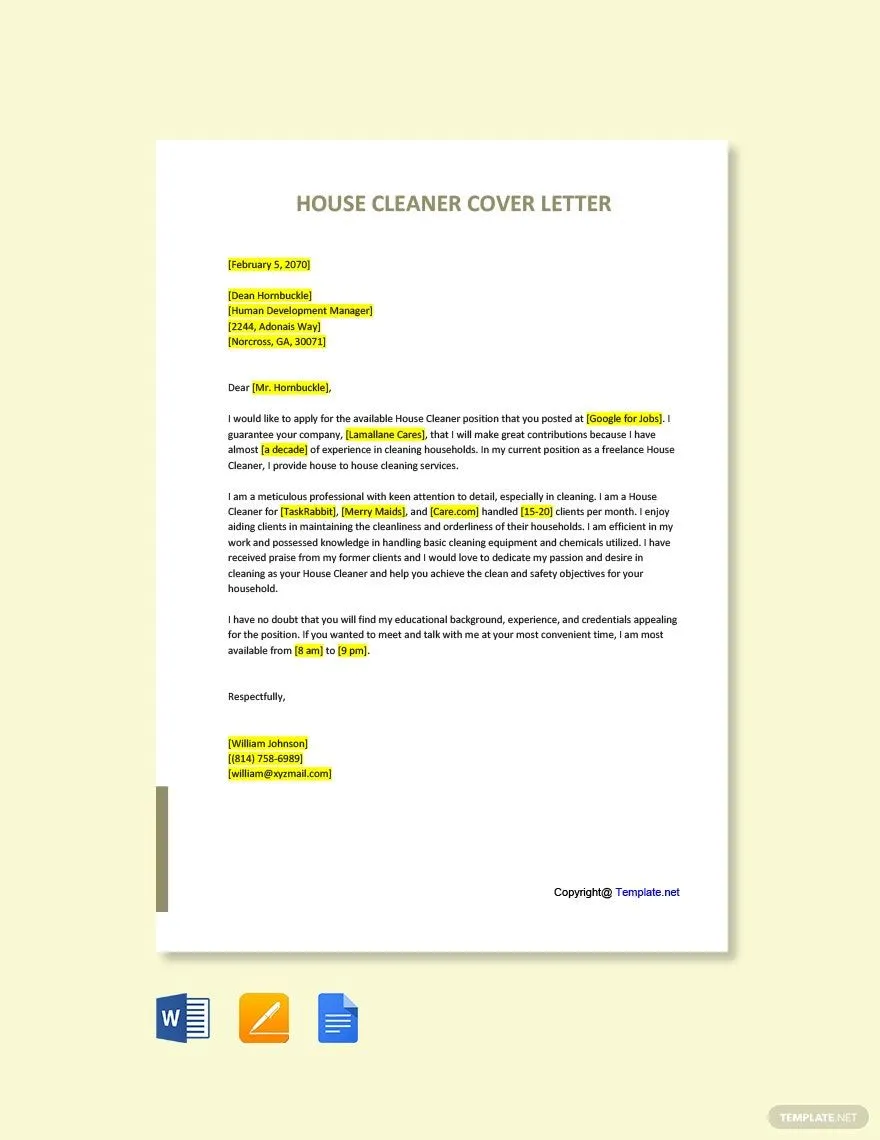
Include skills such as detailed cleaning, sanitization, and knowledge of cleaning products. Highlight your ability to work independently, time management, and attention to detail. Mention any experience with specific equipment like vacuum cleaners, floor buffers, and industrial cleaning machines. Other relevant skills include a strong work ethic, reliability, and the ability to follow instructions. If you have any certifications related to cleaning or safety, be sure to list them. Tailor this section to match the specific requirements listed in the job description, making sure the hiring manager can see that you have what it takes to succeed.
Detailing Your Cleaning Experience
Provide specific details about your cleaning experience. Mention the types of environments you’ve cleaned (residential, commercial, offices, etc.). Describe the scope of your cleaning duties, such as dusting, vacuuming, mopping, window cleaning, and bathroom sanitation. Include the names of previous employers, the duration of your employment, and a brief overview of your responsibilities. Use action verbs to describe your accomplishments, such as “Maintained,” “Cleaned,” “Sanitized,” and “Organized.” Providing specifics shows that you have hands-on experience and know how to perform the required tasks efficiently and effectively.
Quantifying Your Achievements
Whenever possible, quantify your achievements to make your cover letter more impactful. Instead of saying “Improved cleaning efficiency,” try “Increased cleaning efficiency by 15% through the implementation of a new cleaning schedule.” If you received positive feedback, mention the number of positive reviews or the percentage of satisfied clients. Quantifiable achievements demonstrate your ability to deliver results and provide concrete examples of your skills in action. If you have experience managing a team, specify the number of people you supervised and the results achieved under your leadership. Highlighting measurable accomplishments demonstrates your ability to add value to the company.
Addressing the Employer’s Needs
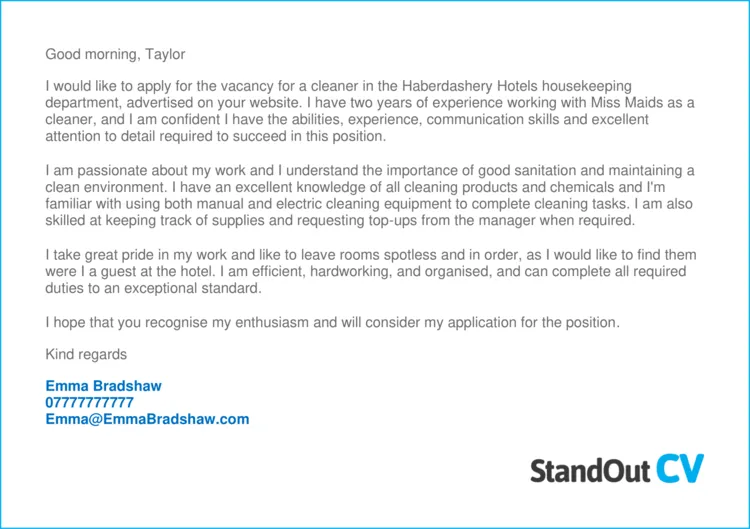
Show the employer that you understand their needs by addressing the requirements and expectations listed in the job description. Mention specific skills, experiences, or qualities they are looking for and explain how you meet those criteria. This shows that you have taken the time to understand the position and are a good fit for the role. For example, if the job description emphasizes attention to detail, provide specific examples of your meticulous approach to cleaning tasks. This demonstrates that you are not only qualified but also a good match for the company’s culture and values. Focus on what the employer is looking for to maximize your chances of getting hired.
Researching the Company
Before writing your cover letter, research the company. Understand their mission, values, and the services they provide. This knowledge will help you tailor your cover letter to their specific needs and demonstrate your genuine interest in working for them. Visit their website, read customer reviews, and check their social media profiles. Use the information you gather to personalize your letter, mentioning specific aspects of the company that appeal to you or how your skills align with their goals. Tailoring your letter shows that you’re serious about the job and willing to put in the extra effort.
Tailoring Your Letter
Customize your cover letter for each job application. Generic cover letters often fail to impress employers. Instead, personalize your letter by mentioning the specific job title, addressing the hiring manager by name (if possible), and highlighting the skills and experience that are most relevant to the position. Review the job description carefully and incorporate keywords and phrases used by the employer. Tailoring your letter shows that you’ve put effort into the application and that you understand the specific requirements of the job. Always review and adjust your cover letter for each position you apply for.
Expressing Enthusiasm and Interest
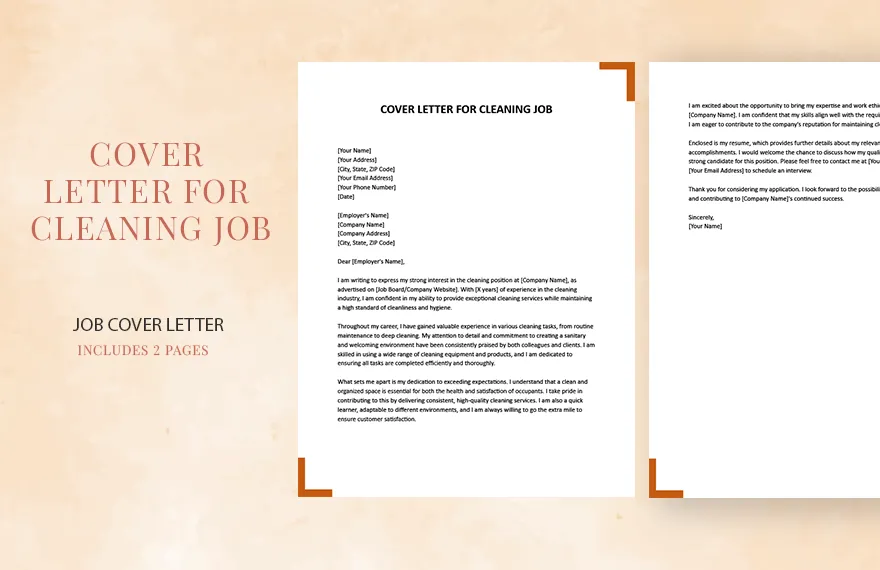
End your cover letter by expressing your enthusiasm and interest in the position. Reiterate your key qualifications and how they align with the company’s needs. Mention your eagerness to learn more about the opportunity and discuss how you can contribute to the team. Avoid generic phrases; instead, use specific language that shows you’re genuinely interested. For example, you could say, “I am excited about the opportunity to join [Company Name] and contribute to your team’s commitment to providing exceptional cleaning services.” Show your interest in a way that makes the hiring manager excited to meet you.
Closing Your Cover Letter
Conclude your cover letter professionally. Thank the hiring manager for their time and consideration. Include a call to action, such as “I look forward to the opportunity to discuss my qualifications further in an interview.” Reiterate your contact information, and sign off with a professional closing, such as “Sincerely,” or “Respectfully.” Ensure that your closing matches the tone of your letter, showing your professionalism and attention to detail. A well-crafted closing reinforces your interest in the position and encourages the hiring manager to take the next step in the hiring process. Make sure your contact information is current and correct.
Proofreading and Editing
Before submitting your cover letter, carefully proofread and edit it for any grammatical errors, typos, or inconsistencies. Errors can undermine your credibility, so take the time to review every word. Use a grammar checker, but also read the letter aloud to catch any awkward phrasing or errors that a grammar checker might miss. Have a friend or colleague review your letter as a second set of eyes can often spot mistakes that you might overlook. Ensure that the formatting is consistent and that all sections of the letter flow logically. A polished and error-free cover letter shows professionalism and attention to detail, qualities that are highly valued in the cleaning services industry.
Common Mistakes to Avoid
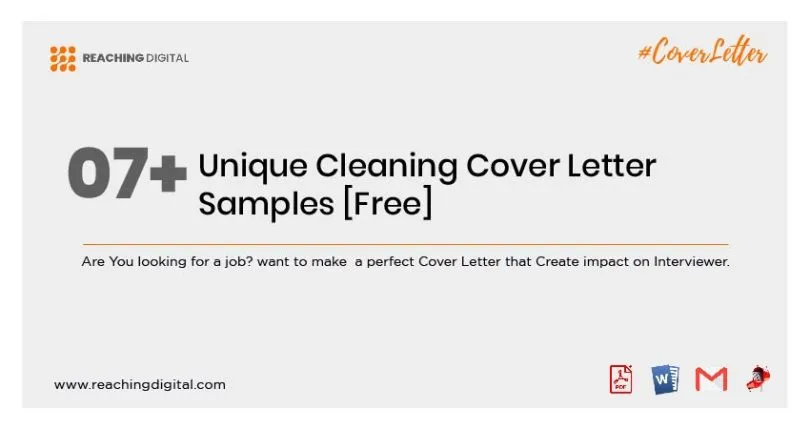
Avoid these common mistakes to make your cover letter stand out. Do not use generic templates without customizing them for the specific job. Avoid typos, grammatical errors, and overly long sentences. Do not be negative or include any information about why you left a previous job. Avoid focusing solely on what you want instead of what you can offer the employer. Refrain from making unrealistic claims or exaggerating your skills. Avoid using slang or unprofessional language. By avoiding these pitfalls, you’ll increase your chances of getting your cover letter read and securing an interview. Remember to tailor your letter for each job to make sure you don’t commit any of these common mistakes.
